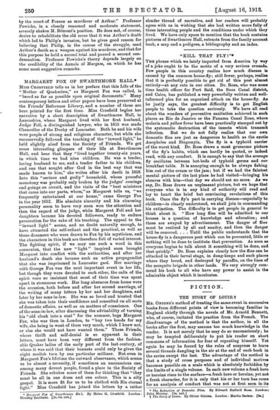"KILL THAT FLY I "•
THE phrase which we lately imported from America by way of a joke ought to be the motto of a very serious crusade. Few people in this country realize how much disease is caused by the common house-fly; still fewer, perhaps, realize that it is perfectly possible to get rid of this peat almost entirely—at any rate in our cities. Dr. Ross, who was some time health officer for Port Said, the Suez Canal district, and Cairo, has published a very powerfully written and well- informed plea for an organized attack on the house-fly. As he justly says, the greatest difficulty is to get English people to take the question seriously. We have all read about the wonders of preventive sanitation achieved in such places as Rio de Janeiro or the Panama Canal Zone, where malaria and yellow fever have been practically stamped out by the systematic destruction of the insects which transmit infection. But we do not fully realize that our own domestic flies are just as dangerous to health as the exotic Anopheles and Stegomyia. The fly is a typhoid carder of the worst kind. Dr. Ross draws a most gruesome picture of the fly's habits, which can hardly be quoted, or indeed read, with any comfort. It is enough to say that the average fly oscillates between hot-beds of typhoid germs and our breakfast table. It is annoying enough to be always fishing him out of the cream or the jam; but if we had the faintest mental picture of the last place he had visited—bringing his sheaves with him—that day we should eat no more. As we say, Dr. Ross draws an unpleasant picture, but we hope that everyone who is in any kind of authority will read and lay to heart the brief but convincing revelations of this book. Once the fly's part in carrying disease—especially to children—is clearly understood, we shall join in commanding his extinction. The difficulty is to get people in general to think about it. " How long flies will be admitted to our houses is a question of knowledge and education ; and these are swayed by advertisement. The danger of flies must be realized by all and sundry, and then the danger will be removed. . . . Until the public understands that the house-fly is a dangerous pest which can be prevented, little or nothing will be done to institute that prevention. As soon as everyone begins to talk about it something will be done, and that quickly." Dr. Ross explains clearly how the flies can be attacked in their larval stage, in dung-heaps and such places where they breed, and destroyed by paraffin, on the lines of the mosquito brigade in other lands. We very strongly com- mend his book to all who have any power to assist in the admirable object which it inculcates.


































 Previous page
Previous page